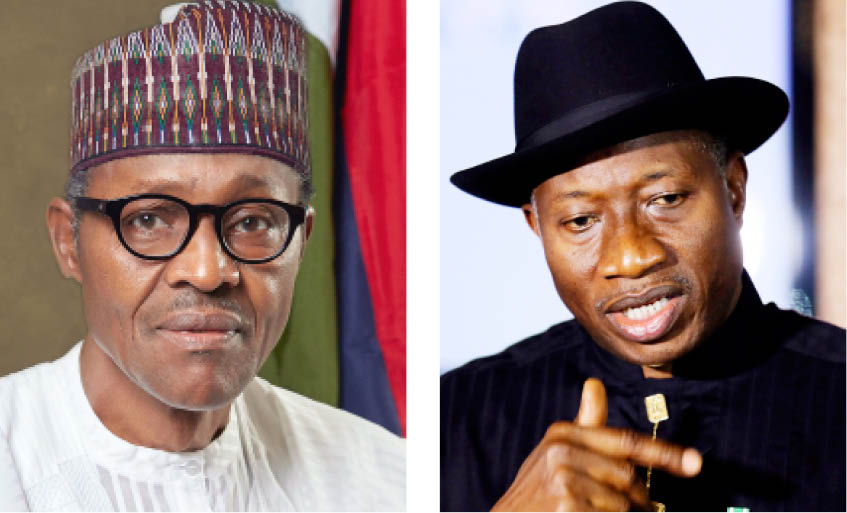CSOs demand probe of ‘$1.2m NNPC bribe used to finance Jonathan, Buhari elections’
Pro-democracy campaigners have at different times expressed worry over campaign funding and failure…

Some Civil Society Organisations (CSOs) have demanded a probe of the report that bribes paid to the Nigerian National Petroleum Corporation (NNPC) were used to fund the 2015 and 2019 general elections.
Bloomberg had reported how lawsuits in London and New York shed light on fees trading firms paying agents to win NNPC oil contracts, saying the funds may have been used to fund the country’s past two general elections.
- Oil revenue: Nigeria’s economy about to collapse, ex-Emir Sanusi raises alarm
- Bandits impose tax on Katsina farmers
President Muhammadu Buhari and ex-President Goodluck Jonathan were key contestants of the elections.
Quoting filings in a suit filed by an ex-employee of the British oil giant, BP Plc, Bloomberg reported that $300,000 and $900,000 were paid to intermediaries in 2014 and 2018 as part of the lobby for lucrative contracts, with the funds said to be funnelled into electioneering activities.
Speaking on the allegations, the executive director of the Civil Society Legislative Advocacy Centre (CISLAC), Auwal Musa Rafsanjani, lamented the failure of the government to block leakages and take measures to control the use of dirty money in politics.
Rafsanjani, who is also the coordinator, Transparency International (TI) in Nigeria, said the CISLAC had been calling for stronger sanctions against those corrupting and commercialising the country’s electoral process.
“The last election in 2019 showed gross impunity and open use of public funds to finance some individual’s elections without being sanctioned.
“There have been credible allegations that show how some officials in the NNPC were involved in financing individual’s elections and nothing was done to even stop the continuation of such abuses of public funds.
“Again, with the 2023 elections approaching, such abuses will continue since there is no political will to sanitise our electoral process,” Rafsanjani said.
Also, the executive director, Resource Centre for Human Rights and Civic Education (CHRICED), Dr Ibrahim M. Zikirullahi said, “This is another scandal in which Nigeria’s oil company has been fingered.”
He lamented that this particular case is even more worrisome because the electoral process itself was targeted.
“The CHRICED believes these allegations should be comprehensively investigated. Who collected the bribes in question, and how were the monies used in the electoral process? These questions demand urgent answers, and those found culpable should be held accountable,” Zikirullahi said.
Pro-democracy campaigners have at different times expressed worry over campaign funding and failure of the Independent National Electoral Commission (INEC) to monitor the source of campaign funds and spending limits by candidates.
According to Bloomberg, a former Glencore Plc employee in July admitted paying a middleman $300,000 to secure a crude shipment from the NNPC, understanding the money would be spent on the nationwide vote that took place four years earlier.
Jonathan Zarembok, who left BP’s West Africa desk last year, said in the suit that he suspected fees paid by the United Kingdom energy giant to obtain NNPC contracts would go toward the 2019 elections.
He filed an employment claim against the BP, alleging he was fired for raising concerns about the large sums being transferred to intermediaries to win business in Nigeria.
Zarembok said in a witness statement made public this month that emails sent in 2017 by a BP executive in Nigeria were a “clear red flag” and implied “there would be pressure to pay bribes.” The emails discussed how preparations for elections would get underway in 2018. “We understand what that means,” the executive wrote.
The company then wired $900,000 in fees to a local agent after securing two oil cargoes from the NNPC, he said.
“BP is defending in full and denies all allegations made by the claimant,” the company noted in a statement.
It’s not true – NNPC
The NNPC Group General Manager, Public Affairs Division, Garbadeen Muhammad, said the allegation was “not true”.
When contacted, the APC deputy national publicity secretary, Yekini Nabena, simply said, “The story is inconsequential for now until they come up with specifics.”
Efforts to get the reaction of the PDP were also not successful as the national publicity secretary of the party, Kola Ologbondiyan, did not respond to phone calls. He was also yet to react to the SMS and WhatsApp messages sent to him.
Muideen Olaniyi, Abbas Jimoh, Zakariyya Adaramola & Saawua Terzungwe
